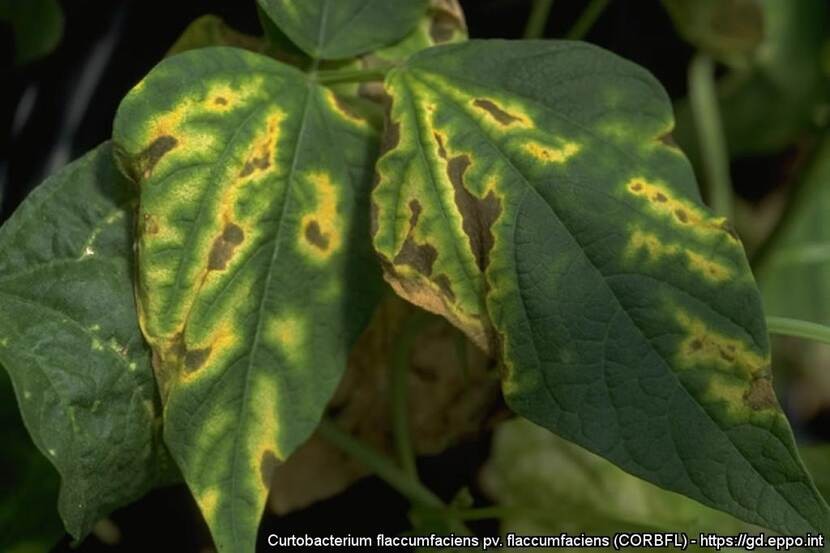Import controls: testing of seeds of beans for detection of latent infection of Curtobacterium flaccumfaciens pv. flaccumfaciens (Cff) starting in 2025
Publicationdate: 2 december 2024
Do you import seeds for sowing of common bean (Phaseolus vulgaris) or runner bean (P. coccineus)? These seeds may be infected with the European Union quarantine organism Curtobacterium flaccumfaciens pv. flaccumfaciens (Cff). Starting 6 January 2025 the NVWA will implement additional import measures in response to recent interceptions and an outbreak of Cff in the Netherlands. Risk-based testing for detection of latent infection is mandatory within European legislation.

Image: ©EPPO / David Caffier
Cff is a European quarantaine organism
Cff is a bacterium that causes wilting symptoms in many Fabaceae crops. The bacterium is known to be transmitted from seeds to seedlings in some of its hosts. Although Cff is an EU-quarantine organism there are currently no specific requirements for import of products that are host to the bacterium. Cff can cause latent infection and can not reliably be detected through field- and visual seed inspections. The organism can be detected using laboratory testing. The current lack of specific testing requirements for seeds for sowing, poses a risk for introduction of Cff in the Netherlands and other EU member states via latently infected seeds.
Additional measures: sampling and testing during import controls
Starting January 6th 2025 up to 50% of the consignments containing seeds for sowing of P. vulgaris and P. coccineus of all origins will be officially sampled and tested for Cff as part of the official controls. Consignments will be put on-hold pending the test results. The processing time of the testing can take 3 to 6 weeks, possibly causing considerable delay before release of the consignment. Since this is a risk-based measure, consignments that have been tested in the country of origin or in the country of re-export may be excluded from the additional measures. To this end, an additional declaration indicating the testing of each lot has to be included on the Phytosanitary Certificate. Other documents, like laboratory attests accompanying the consignment, will not be accepted as proof of testing the consignment.
How are the consignments selected?
At import the authorities randomly select 50% of the consignments of P. vulgaris and P. coccineus for sampling. One lot of each selected consignment will be tested.
Indicate the biological species name in CLIENT-Import
Phaseolus species other than P. vulgaris and P. coccineus are not subjected to 100% official controls in case of import to the EU (Plant Health Regulation art. 72). Please indicate the product name to the species-level at the moment of registration in CLIENT Import to avoid unnecessary delays at import inspection. Products other than P. vulgaris and P. coccineus for which only the genus (Phaseolus) is mentioned on the official documents could be selected and tested as there is no way to exclude that the consignment contains art. 72 products.
Consignments will be put on-hold
Processing and testing of the seed samples can take 3 to 6 weeks. During this period the sampled lot, as well as other lots of P. vulgaris and P. coccineus in the same consignment will be put on-hold. It is not allowed to move, adjust, sample or change the packaging of the product(s) during that period. Under some circumstances processing to ensure the preservability of the products is permitted. Ask for the possibilities at he official inspection location.
Test results
Do the test results come back negative? The lot is not infected with Cff and the consignment can be imported. If the test results are positive the lot may be infected with Cff. You will be informed by the authorities on the measures to be taken.
What happens when a lot is infected with Cff?
In case the test results indicate that the lot is infected with Cff, the lot has to be destroyed or returned to the country of origin. The positive result will also have consequences for the other lots in the same consignment (on the same phytosanitary certificate). The professional operator has to select one of three options for the related lots:
- Destroy the related lots
- Return the lots to the country of origin
- Subject all related lots to official testing
In case the related lots are tested negative for Cff the lots can be imported into the EU.
A positive result in the process of import controls can prompt further investigations. NVWA can take measures on related seed lots on other consignments as well.
The costs for the sampling and testing will be charged to the official operator.
European import measures needed
Similar measures are or will be taken by other Member States. The European Commission will possibly issue a temporary regulation in which the measures and potentially additional requirements for import will be harmonized among the Member States. Possibly, a wider range of products (seeds of other Fabaceae species) will be included in the regulation as they are known to be susceptible to infection with Cff. The regulation is expected to go into effect in the first half of 2025.
